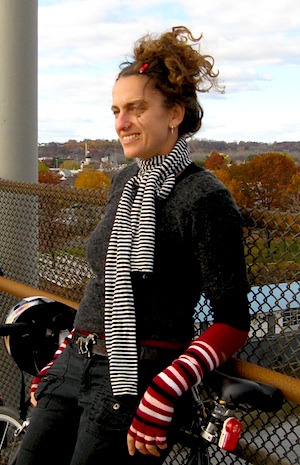
| Jacket 40 — Late 2010 | Jacket 40 Contents | Jacket Homepage | Search Jacket |
This piece is about 4 printed pages long.
It is copyright © Jen Hofer and Jacket magazine 2010.
See our [»»] Copyright notice.
The Internet address of this page is http://jacketmagazine.com/40/at-hofer-jen.shtml
Back to the A Tonalist feature Contents list
All the things we have not found a way to mean — what we spend, unplanted, to keep ourselves in stock or trade, to keep ourselves hurtling, streets paved with chemical waste, air paved instead of liquid, flowers budding just so, the jostle of contact without contact — the jostle of contact without contact in a context where there ceases to be any sky and all we have is the world which we quickly erase quickly erasing us.
First the sun was in our eyes, then the sun was at our backs, violent and lovely, the asphalt glinting like a river, the river glinting like a river, the trains’ metallic breath tractoring through a prior time we could not see even if we wanted to, and we did want to, but this made no difference at all as the starlings sang carcinogenically on the transmitter tower.
The vividness of sidewalks and conflicts rivaled by the bright of a spot receding from our view not drawing us magnetically but magnetically repelling away from us, as we watch it going, it is about to be gone, replaced by sunspots, small shadows of space we mis-identify as objects, as we misidentify people and occurrences, if we bother to identify them at all.
If the coastline were a ribbon I would not untie it, if the coastline were a snake I would not charm it, if the coastline were a comma I would not make it come to a complete stop, if the coastline were a spool of thread I would not wind it, if the coastline were a scarf I would not let it get caught in the wheel of my convertible.
The difference between a gardenia and a gladiolus, the difference between a moon and a hubcap, the difference between standing under a doorway and crouching under a desk, how our bodies harbor legibility like an exacto blade, to be held carefully and used in the appropriate circumstances.
Inexplicable the stacks and scatters that contain our lives, stacked, scattered, perhaps all too explicable, boxed and labeled for shipping, routed through impeccable skyless cities designated for that purpose along a sinewy chain of command and conquer, or just categorize, the underworld consisting of a dust-scuttled basement where we are permitted to store our boxes, unavoidably mislabeled and packed in haste, in anticipation of being forced to flee.
Atonement: let me count the ways.
Inescapable, inveterate, intransigent, in transit, slippery, supersonic, synaptic, cemented, commemorated, flickering, sentient, monochromatic, rippled, scurrying, disinterred, unseasonable, inopportune, partisan, argumentative, witholding, sleepless, dizzying, bullying, unyielding, yielding, succumbing, unaccustomed, overstated, underdeveloped, wet — that’s how the rain was.
In Los Angeles the buildings cluster and conglomerate, then somersault on a decline to scatter to the horizon, imagined always to the west, the map-edge and actual edge of our actual continent, or else to the east, where the horizon is a thought-line slotting into place farther and farther from our gaze, dovetailing into names of other towns, less teeming, unless you count transit and commerce as teeming.
What is the etymology of the word “sweater,” we wondered, why is the clanger on a bell called a clapper, and how are we to continue in the context of such loss, whole real or imagined persons, tissue segments, pieces of flesh we cannot necessarily live without yet we will, live without them, wear sweaters, swing clappers when there are clappers to be swung, pendulum-like as few things are, with each leg of the trip longer than the last.
A flat surface, a flat level plane, a flat smooth even dull surface, a flat, rutted, raked, scraped, clean surface, a plane raked clean, swept, swathed, bathed, disinfected, a ruined month, two ruined months, a city block razed to the ground in increments with addresses, a person who is not allowed to become a person, a person who is not allowed to be a person, a person who is no longer a person, a flat smooth clean — cleaned — bleached antiseptic surface, a dull even uniform unmarked plane.
To conjure you here I am thinking specifically of the manner in which a Chinese elm drops its spores — if the term pertains — into even exceedingly inhospitable earth (I am not thinking, yet it is happening, occurring, proceeding, plodding, bursting at the seams whether or not we can see them), specifically of how the feathery fronds become stubborn, supple, intractable like legislation or air traffic control mechanisms, the operative word being “traffic” yet we persist in romantic notions, the way the elm persists despite — despite or because.
The single point, tiny opening, unintended fissure, erroneous accident, collision unrealized leaving an uneven gap, made of many points or indicators or place-holders as any point or space is, very difficult to identify precisely, and who said precision is the key or measure, who claimed to know how to proceed and yet we proceed, and yet we protract.

Jen Hofer
Jen Hofer is a Los Angeles-based poet, translator, interpreter, teacher, knitter, book-maker, public letter-writer, and urban cyclist. Her most recent books are a series of anti-war-manifesto poems titled one (Palm Press, 2009); sexoPUROsexoVELOZ and Septiembre, a translation from Dolores Dorantes by Dolores Dorantes (Counterpath Press and Kenning Editions, 2008); The Route, a collaboration with Patrick Durgin (Atelos, 2008); and lip wolf, a translation of lobo de labio by Laura Solórzano (Action Books, 2007). She teaches at CalArts, Goddard College, and Otis College, and works nationally and locally as a social justice interpreter. She can be reached through www.jenhofer.net